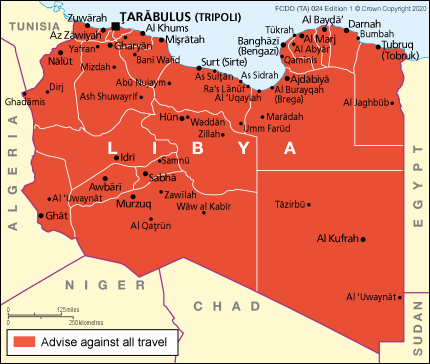
The Foreign, Commonwealth & Development Office (FCDO) advise against all travel to Libya. This advice has been in place consistently since 2014. If you’re in Libya against this advice, you should seek to leave immediately by any practical means.
All travel to, from and within Libya is at the traveller’s risk. Local security situations are fragile and can quickly deteriorate into intense fighting and clashes without warning.
Travel to Libya is subject to entry restrictions
- Due to the ongoing coronavirus (COVID-19) pandemic, Libya’s air, land and maritime borders have regularly been closed, without notice.
If you plan to travel against FCDO advice, see Entry requirements for more information before you plan to travel.
Preparing for your return journey to the UK
If you’re returning to the UK from overseas, you will need to:
Check our advice on foreign travel during the coronavirus (COVID-19) pandemic.
If you’re planning to travel to Libya against FCDO advice find out what you need to know about coronavirus in the Coronavirus section.
During the COVID-19 pandemic, it is more important than ever to get travel insurance and check it provides sufficient cover. See the FCDO’s guidance on foreign travel insurance.
Consular support is not available from the British government from within Libya, as consular operations remain suspended. If you need to speak to a consular officer, call the FCDO in London on +44 (0)20 7008 5000 or email Tunisconsular.enquiries@fcdo.gov.uk.
Military clashes and inter-militia fighting pose significant risks to air travel in Libya. It has periodically caused the temporary suspension or closure of airports. All airports are vulnerable to attack. Mitiga Airport, Tripoli’s only functioning civilian airport, has been regularly shelled by artillery, most recently on 9 May 2020. FCDO staff do not regularly travel by air to or from Mitiga. See Air travel
Since April 2019, there has been a significant build-up of militarised forces across western and central Libya. See Safety and security
Terrorists are very likely to try to carry out attacks in Libya. In August 2019, a car bomb explosion in the eastern city of Benghazi killed five, including three foreign nationals. There remains a high threat throughout the country of terrorist attacks and kidnap against foreigners, including from Daesh-affiliated extremists (formerly referred to as ISIL) and Al Qaida, as well as armed militias. Daesh and Al Qaeda have attacked a number of oil and gas installations and killed or kidnapped workers, including foreign nationals. See Terrorism
In August and September 2020 both Tripoli and Benghazi saw demonstrations against deteriorating living conditions and corruption. Pockets of violence were seen, with reports of civilians being shot and wounded.
If you choose to travel to Libya against FCDO advice, you should get the right visa, or risk deportation. See Entry requirements
If you’re entering Libya as a media representative, you should get press accreditation from the relevant Libyan authorities.